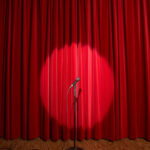Yesterday, in between meetings in Hollywood, I ducked into a coffee shop. It was one of those rare, wet days in L.A.—you know, the kind where you actually see rain falling from the sky and think, Is this real? It’s about as rare as a long-lasting celebrity marriage in this town: surprising, and you’re still not quite convinced it’s really happening.
I grabbed a latte and while I was waiting, the barista gave me a heads-up: “There’s an open mic going on in the back if you’re interested.”
I’ll admit, I was tempted. There’s always that curiosity—what kind of material are people working on? Is someone about to surprise the room and crush? But I had work to do, and nothing feels more awkward than sitting in the back with a laptop, looking like you’re live-blogging everyone’s five-minute set. Worse, it makes you look like that comic—the one who’s physically present but mentally somewhere between TikTok and their screenplay rewrite.
So I stayed out front, sipped my coffee, and got some writing done. Eventually, a group of comedians trickled out of the back room and settled nearby, clearly just finished with their sets. I kept typing, half-listening—until I couldn’t help myself.
The conversation had turned into a full-blown roast of Carrot Top.
One of them kicked it off: “That guy? Total hack. Just a bunch of dumb props.” The others didn’t hesitate to jump on the bandwagon, tossing out names, mocking styles, and slapping labels like “sellout” and “hack” without a second thought.
They circled back to Carrot Top again, as if it were an unresolved wound. “Man, his act is just trash,” someone said.
And this went on. For thirty straight minutes.
I couldn’t help but notice—I could’ve written a tight ten minutes of fresh material in that same window. And yet here they were, spending the better part of a half hour shredding a guy who’s selling out shows nightly in Las Vegas.
And that’s when it really hit me.
These were younger comics, likely half my age, but the conversation itself? Déjà vu. Nothing had changed. Still the same old put-downs. Still the same old judgment.
So I asked myself: Why?
Why is it that so many comedians waste time tearing down others who’ve clearly figured something out? Especially someone like Carrot Top, whose name may spark debate, but whose success is undeniable. The man has turned his comedic style into an empire. His shows in Vegas? Packed. Night after night. He’s got his own theater at the Luxor, one of the premier venues on the Strip.
Think about that for a second. A comedian, working his own lane, turned a supposedly “gimmicky” act into a multimillion-dollar machine. That’s not a fluke. That’s not dumb luck. That’s craft, branding, consistency, and above all—connection with an audience.
So instead of dissecting his act with a sneer, wouldn’t it be more productive to study it? Reverse-engineer how he built that brand? What did he do right? What risks did he take? What lessons are in there that could help you?
Too often, especially in artistic circles, we confuse “criticism” with “credibility.” As if the more people we put down, the higher we climb. But that’s not how growth works. If your focus is on mocking success rather than studying it, you’re running in place.
So, I broke my usual rule—I usually let people say their piece and move on—but my inner New Yorker (with a dash of Irish stubbornness) kicked in.
I turned to the group and said, “Hey, sorry to interrupt. But I couldn’t help overhearing your take on Carrot Top. Just wondering—why put that much energy into dismissing someone who’s clearly done something right?”
They looked at me, slightly taken aback. One of them, probably the ringleader, responded, “You a comic, man?”
I smiled. “You could say that.”
He shot back, “Well, I’d rather keep my integrity than be some cheesy prop comic.”
I paused for a beat and said, “It’s Friday night. Carrot Top is currently performing two back-to-back, sold-out shows in a theater with his name on it. Meanwhile, you just did five minutes at a coffee shop and then spent more time tearing him down than you did actually doing comedy.”
And that was that. I didn’t need to say more.
Because here’s the bigger picture:
There’s so much we all need to focus on to get better. So much craft to sharpen, so much hustle required to move the needle even a little. Every moment we spend judging someone else’s path is a moment we aren’t investing in our own.
Your time and your energy? They’re limited. Spend them building. Spend them learning. Spend them pushing yourself forward. Because success doesn’t come from watching others and shaking your head—it comes from asking, What can I learn from them? and How can I apply that to what I’m building?
So the next time you catch yourself caught in the easy loop of critique, pause. And ask:
Is this really where I want my energy to go?










